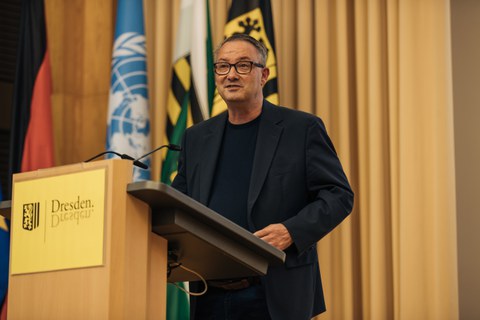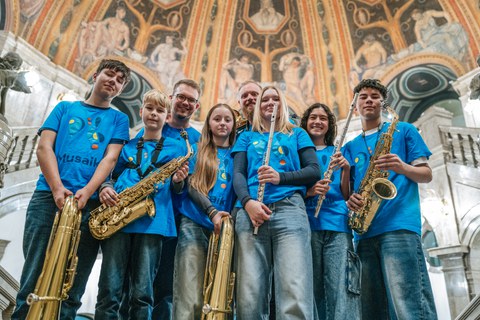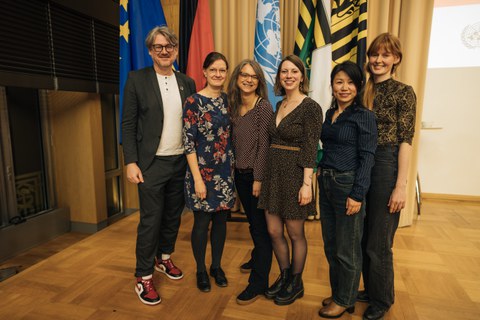Oct 28, 2025
UN Day 2025 in Dresden: Focus on education - ways to achieve more equal opportunities in STEM professions
On October 24, 2025, institutions, initiatives and interested citizens of Dresden's civil society came together at Dresden City Hall to celebrate United Nations Day with a festive event under the motto "Education shapes the future".
In addition to focusing on current challenges, the event focused on gender-specific imbalances in career choices and the existing gender gap in the STEM subjects - mathematics, computer science, natural sciences and technology.
The aim of the exchange was to identify concrete ways in which UN Sustainable Development Goal 4 "Quality Education" can also be promoted at a local level. Among other things, measures to promote girls in scientific and technical fields at an early age and the role of educational institutions in equal opportunities were discussed.
This year's UN Day was also marked by two anniversaries. Both the founding of the United Nations on October 24, 1945, 80 years ago and the 50th anniversary of the United Nations University (UNU) were celebrated. For half a century, the UNU has been promoting knowledge, education and evidence-based solutions worldwide in order to shape a more sustainable and peaceful future.
Ceremony and award ceremony
Jan Donhauser, First Mayor of the state capital Dresden and Alderman for Education, Youth and Sport, opened the ceremony and emphasized in his welcoming address that education and social commitment are central pillars of a peaceful and just future, especially in times of multiple crises. However, education should not only serve individual development, but must also always be a contribution to the cohesion of society.

Jan Donhauser, First Mayor of the City of Dresden, Alderman for Education, Youth and Sport
Donhauser also emphasized the importance of equal opportunities and referred to existing challenges such as poverty, war, climate change, social inequality and the increasing shortage of skilled workers, which is also noticeable in Dresden. To counteract this, the city is investing in a targeted manner in education and training, such as the construction of the new vocational school center for electrical engineering.
Finally, Mr. Donhauser congratulated the prizewinners on their awards and thanked them for their commitment.
Prof. Dr. Christian Leßmann (Chair of Economics, in particular International Economic Relations, TUD Dresden University of Technology) then opened the discussion.

Prof. Dr. Christian Leßmann (Chair of Economics, esp. International Economic Relations, TUD Dresden University of Technology)
In his brief introduction, Leßmann made it clear that a high level of education is crucial for economic growth and social prosperity, both globally and locally. This can be seen, for example, in the correlation between the test results of pupils in typical educational tests such as Pisa and the growth rate of countries. He also referred to falling skills scores in Germany, growing social inequalities in educational success and persistent gender differences in STEM subjects. Leßmann particularly emphasized the close connection between educational equality, social status and long-term opportunities on the labour market. In view of the increasing shortage of skilled workers, these are all topics that are gaining in importance.
In the subsequent panel discussion, representatives from academia and business highlighted different perspectives on educational equality and equal opportunities.

Panel discussion at the UN Day 2025: f.l.t.r.: Prof. Christian Leßmann, TUD; Frank Bösenberg, Silicon Saxony; Henriette Greulich, ZiLL; Prof. Kamila Cygan-Rehm, TUD; Prof. Edeltraud Günther, UNU-FLORES
According to Prof. Dr. Edeltraud Günther (UNU-FLORES), women in many countries choose STEM subjects because they see independence and development opportunities in them. In poorer countries, such as India or African states, the proportion of women in these fields is often higher. The main challenge there is the lack of laboratory equipment. The United Nations is therefore promoting new approaches to enable STEM education even without laboratories. The so-called "gender equality paradox" is also striking, with fewer women studying STEM subjects in countries with a high level of gender equality, such as Scandinavia.
Prof. Dr. Kamila Cygan-Rehm (TUD) emphasized that social inequalities begin before kindergarten and that families from educationally disadvantaged backgrounds in particular often experience structural barriers to accessing early childhood care. She called for more transparent and low-threshold procedures for the allocation of nursery places in order to ensure equal starting opportunities for all children.
Henriette Greulich (Center for Interdisciplinary Learning and Teaching (ZiLL)) pointed out that differences in mathematical and scientific skills already arise during school and can only be compensated for to a limited extent at universities. Study orientation programs and the removal of barriers to entry are important instruments for attracting young women in particular to STEM subjects. At the same time, she warned against reinforcing gender roles and promoting more interdisciplinary approaches that combine technical and social skills.
As a contributor from the field, Frank Bösenberg, Managing Director of Silicon Saxony, provided insights into his wealth of experience. Silicon Saxony is a registered association based in Dresden with the aim of strengthening the economic region of Saxony as a location for microelectronics both nationally and internationally. During the discussion, Bösenberg emphasized the central role of STEM subjects in overcoming global challenges. Engineering and applied natural sciences are indispensable for solving technological and social problems, he said. At the same time, he made it clear that education is not only about technical excellence, but also about communication and teamwork skills. These are skills that have so far been taught too little in university courses.
Bösenberg also spoke out in favor of a greater appreciation of vocational training. In addition to academic degrees, qualified specialists are also crucial in order to meet the needs of industry and keep young talent in the region. He pleaded for alternative career paths to be recognized as equally important.
Looking at global and local perspectives, the participants emphasized that education is the key to social progress and equality and that a joint commitment is needed to achieve this goal.

Mayor's Award presented by Deputy Mayor Eva Jähnigen to the initiative “Opportunities for the Disadvantaged”
The UN Day celebrations also included the award ceremony for special contributions to sustainable development in Dresden, which is now in its 26th year and is organized by the Local Agenda for Dresden e.V. and the Lions Club Dresden Agenda 21. This year, four regional initiatives received the prestigious Local Agenda Award.

Musikproject Musaik e.V.
The social music project Musaik e. V., whose aim is to open up new perspectives for children and young people from different social and cultural backgrounds, give them access to musical education and promote social integration and cultural participation, provided the musical backdrop to the ceremony.
In addition, the ESD Saxony exhibition by curator Sophia Schott (ZukunftsAkademe Leipzig e. V.) was shown under the motto "Paths to education for sustainable development - good examples and practical impulses". The exhibition aims to encourage all visitors to integrate ESD more strongly into their own work and perhaps become the next good example themselves.
In addition to UNU-FLORES, the organizers of the United Nations Day in Dresden include the Local Agenda 21 for Dresden e. V., the City of Dresden, the TUD Dresden University of Technology and its Center for International Studies (ZIS), the United Nations Association of Saxony, Saxony-Anhalt & Thuringia and the Lions Club Dresden Agenda 21 e. V..
The event was broadcast live on the YouTube channel of the state capital Dresden. A recording of the event is also available afterwards via the same link .
The event starts at around the 40th minute.


